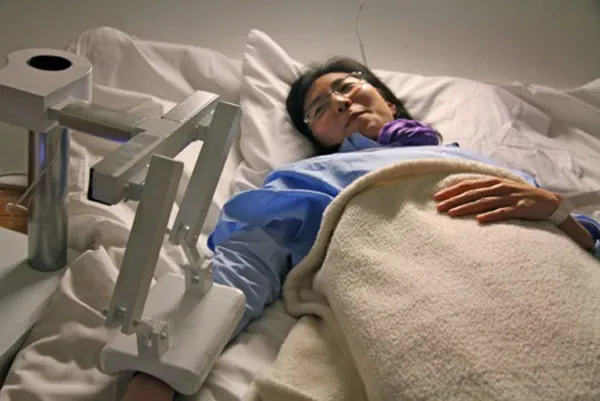Designer, artist and engineer Dan Chen has developed the 'End of Life Care Machine', a machine designed to guide and comfort dying patients with a carefully scripted message. Chen, just graduated from the Rhode Island School of Design, built the machine as one of a series of functional robots capable of reenacting human social behaviors.
The patient enters the specially designed room and lays on the bed. The doctor asks for permission to put the patient's arm underneath the caressing mechanism.
"The device is activated, and an LED screen reads “Detecting end of life.” At this point, the doctor exits the room, leaving the patient alone by him or herself. Within moments the LED reads “End of life detected”, the robotic arm begins its caressing action, moving back and forth, stimulating the sense of comfort during the dying process."
The machine then plays the scripted message:
Hello Susie, I am the last moment robot.
I am here to help you and guide you through your last moment on earth.
I am sorry that (pause) your family and friends can't be with you right now, but don't be afraid. I am here to comfort you. (pause)
You are not alone, you are with me. (pause)
Your family and friends love you very much, they will remember you after you are gone. (pause)
Time of death 11:56
Chen explains this machine is inspired by Paro, a robotic baby seal, which is used for therapeutic purposes. Paro reduces social isolation and uplifts Alzheimer patients by his lifelike behavior. However, Chen questions the form-factor and the quality of intimacy which Paro gives. He therefore questions the deception through technology by replacing humanity with robotics through his 'Robotic Intimacy Device' (RIT).
The point is interesting: Replacing humans with machines at the final and very emotional stage of life. Chen dares to question if robots are able to replace that human intimacy. For the purpose of debate, I highly reject his proposition.
Chen implies that his robot is intimate by the name he has given it, and that his design could replace human contact (otherwise he would not have entered the discussion if robots could do this). He also implies that his proposition is better than that of Paro's designers. The quality of Paro lies in its lifelike qualities. People can engage, and most importantly, identify with this social robot. This creates an empathic and emotional bond, as Sherry Turkle explains in her book Alone Together: Why we expect more from technology and less from each other. However, Dan Chen's device is a mechanical substitute for touch and speech, far from Paro's the empathic and intimate qualities.
In my view the machine looses its intimacy directly after the doctor asks for permission. Intimacy is special, subtle and foremost experienced. Have you ever had someone you've just met ask you if you want to get married? Intimacy happens when there is an interaction between two parties (product, people, animals, etc). Not when a machine performs a trick, but when a machine reacts to what you are experiencing. This creates a bond. Just like Paro.
Furthermore, intimacy lies in the realm of the abstract. Technology is often abstract in that it acts as a medium to generate intimacy between persons. In this case there is only a machine and a person. The machine talks and moves, nothing more. If the machine had a personality, a certain way of interacting or some sort of representation of a loved one it could generate the experience of intimacy.
Instead, Chen creates a cold mechanical scenario without actually implementing any intimacy or empathy. It lacks depth, theory and realism. Therefore the discussion of robots replacing humans in a intimate situation is not as valid as he depicts it.
Chen has begun an important discussion. But is it the right one?
Via Dan Chen


Comments (0)
Share your thoughts and join the technology debate!
No comments yet
Be the first to share your thoughts!